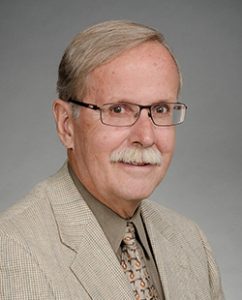Dr. Ronald Maier Presents AAST Fitts Lecture
 By – Patrick K. Kim MD, FACS, Associate Professor of Clinical Surgery, Perelman School of Medicine at the University of Pennsylvania Trauma Program Director, Trauma Center at Penn
By – Patrick K. Kim MD, FACS, Associate Professor of Clinical Surgery, Perelman School of Medicine at the University of Pennsylvania Trauma Program Director, Trauma Center at Penn
Ronald V. Maier, MD, FACS, FRCS Ed (Hon.) presented the 43rd William T. Fitts, Jr, MD, Lecture at the 76th Annual Meeting of American Association for the Surgery of Trauma (AAST) and Clinical Congress of Acute Care Surgery in September 2017. The Jane and Donald D. Trunkey Professor of Trauma Surgery, Vice Chair of Department of Surgery, University of Washington, and Surgeon-in-Chief, Harborview Medical Center has held many leadership positions in surgery. His academic expertise spans the continuum from basic science investigation to trauma systems.
Dr. Maier’s lecture, “Patients Are First,” was a call to arms for incorporating Palliative Care into Trauma Surgery, Emergency General Surgery and Surgical Critical Care. He described the magnitude of the problem of caring for the seriously ill and injured, showing disappointing statistics for mortality and the poor quality of life of survivors. He reminded us that elder patients comprise half of trauma patients and 45% of emergency general surgery patients, and that elder patients suffer worse outcomes after trauma or emergency surgery. He said that these ill and injured patients need better palliative care, and providing palliative care is the next challenge our field must address.
Dr. Maier then reviewed the reasons why palliative care was traditionally resisted in ICUs, including a lack of palliative care skills and resources, an exaggerated sense of covenant to patient, a disregard for understanding patient wishes, and a view that palliative care and ICU care are mutually exclusive.
“The surgeon is the problem,” Dr. Maier said. This is because surgeons have traditionally practiced using the Golden Rule —“Do unto others as you would have them do unto you”— that is, the surgeon should choose the treatment for the patient as if the surgeon were the patient.
Dr. Maier stated that the Golden Rule is consistent with surgical ethical principles of commitment, contract/covenant to patient, treating complications and rescuing the patient whenever possible. However, he contended that the Golden Rule does not always lead to appropriate decision making, because it takes into account only the surgeon’s perspective, not the patient’s.
He recommended that surgeons incorporate principles from medical ethics: autonomy, justice, beneficence, and non-maleficence. Of these, “patient autonomy is the highest rule,” he said. Based on this, instead of the Golden Rule, he proposed a new paradigm, the Platinum Rule: “Treat the patients the way THEY want to be treated.”
Dr. Maier emphasized the importance of communicating to connect with the patient. He said that the surgeon should understand the patient’s expectations and goals of care (“What outcomes are most important to you?”) and importantly, the patient should feel the care team’s respect and support for his/her decisions. Dr. Maier offered a framework to assure meaningful discussion. He advocated incorporating “best case,” “worst case” and “most likely” course for both operative and non-operative hospital courses.
Dr. Maier ended by proposing an updated paradigm of Acute Care Surgery: Trauma Surgery, Emergency General Surgery, Critical Care and Surgical Palliative Care. He urged surgeons in these fields to continue leadership in surgery and medicine by embracing the role of palliative care in patient care.
